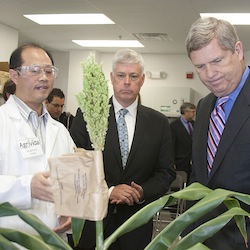 Livestock and poultry producers are filing a petition with the Environmental Protection Agency (EPA) seeking a waiver from the Renewable Fuel Standard (RFS) in light of the current drought situation likely to cause feed shortages.
Livestock and poultry producers are filing a petition with the Environmental Protection Agency (EPA) seeking a waiver from the Renewable Fuel Standard (RFS) in light of the current drought situation likely to cause feed shortages.
“I and NCBA support American ethanol,” said National Cattlemen’s Beef Association president J.D. Alexander of Nebraska. “I’m not asking for a handout. I’m asking for the federal government to let the market work.”
“Relief from the Renewable Fuel Standard is extremely urgent,” said Past National Chicken Council chairman Michael Welch, President & CEO of Harrison Poultry in Bethlehem, Georgia.
Alexander and Welch were joined at a morning press conference by Randy Spronk of Minnesota, National Pork Producers Council president-elect and John Burkel, Minnesota turkey grower and National Turkey Federation vice chairman.
Listen to opening comments at a press conference this morning from the four organization leaders here: Livestock and Poultry groups
Under questioning by reporters, the groups were pressed about their legal capability of being able to even request the waiver, since the Clean Air Act states that a waiver can only be filed by an EPA administration, obligated party, or a governor – as was the case with Rick Perry of Texas in 2008. Michael Formica, NPPC Chief Environmental Counsel, clarified. “We petitioning her (EPA Administrator Lisa Jackson) to use her authority to waive the rule,” he said.
Listen to questions and answers from the press conference here: Livestock and Poultry Q&A
 National Corn Growers Association (NCGA) President Garry Niemeyer of Illinois says they believe it is premature to ask for a waiver of the RFS right now, but better than asking for a change in the law. “With the crop still in the field, it is too early to determine this year’s final corn supply. In addition, the ethanol industry now has a significant surplus of ethanol and RFS credits that can greatly offset ethanol’s impact on the corn supply,” he said. “However, we recognize the severe impact of the drought on our farmers and our customers, here and abroad, with livestock, poultry, ethanol and other processing facilities, and we believe the flexibility of the RFS does work, and will work. NCGA also supports the waiver process that is embodied in the current RFS, and respects the right of those that may file a waiver petition to do so.”
National Corn Growers Association (NCGA) President Garry Niemeyer of Illinois says they believe it is premature to ask for a waiver of the RFS right now, but better than asking for a change in the law. “With the crop still in the field, it is too early to determine this year’s final corn supply. In addition, the ethanol industry now has a significant surplus of ethanol and RFS credits that can greatly offset ethanol’s impact on the corn supply,” he said. “However, we recognize the severe impact of the drought on our farmers and our customers, here and abroad, with livestock, poultry, ethanol and other processing facilities, and we believe the flexibility of the RFS does work, and will work. NCGA also supports the waiver process that is embodied in the current RFS, and respects the right of those that may file a waiver petition to do so.”
 Hawaii has passed legislation, a Renewable Portfolio Standard, requiring 40 percent of the state’s energy be supplied by renewable energy by 2030. HECO has a Feed-in-Tariff (FIT) program designed to encourage more renewable energy projects throughout the state and will be “purchasing” renewable energy credits when the solar PV project goes online.
Hawaii has passed legislation, a Renewable Portfolio Standard, requiring 40 percent of the state’s energy be supplied by renewable energy by 2030. HECO has a Feed-in-Tariff (FIT) program designed to encourage more renewable energy projects throughout the state and will be “purchasing” renewable energy credits when the solar PV project goes online.



 The
The 


 “This summer’s hot, dry weather conditions have caused significant challenges for all users of grain,” Dinneen said. “We understand the hardships facing the agriculture industry this summer are serious. From extremely poor pasture conditions to heat stress on animals to reduced crop yield potential, this summer’s circumstances have been difficult. However, waiving the RFS won’t bring the type of relief the livestock groups are seeking, nor will it result in significantly lower feed prices. In fact, because ethanol plants also produce a high protein feed, limiting ethanol production will only further complicate drought related feed issues and costs.”
“This summer’s hot, dry weather conditions have caused significant challenges for all users of grain,” Dinneen said. “We understand the hardships facing the agriculture industry this summer are serious. From extremely poor pasture conditions to heat stress on animals to reduced crop yield potential, this summer’s circumstances have been difficult. However, waiving the RFS won’t bring the type of relief the livestock groups are seeking, nor will it result in significantly lower feed prices. In fact, because ethanol plants also produce a high protein feed, limiting ethanol production will only further complicate drought related feed issues and costs.”


